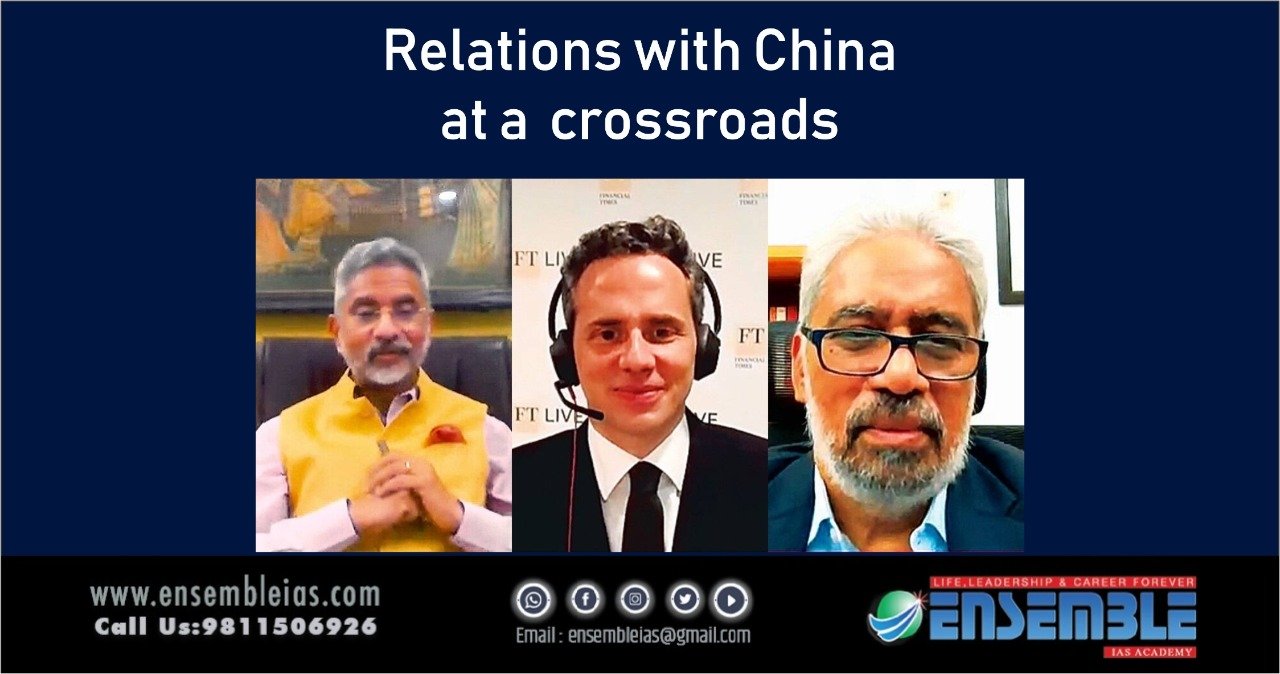Relations with China at a crossroads’: S Jaishankar
Relations with China at a crossroads’: S Jaishankar: When one contemplates the world today, it’s important to first understand what it is not. It is not cold war 2.0 because you don’t have that kind of sharp military confrontation that the Cold War did. The systems are not as firewalled as they were in that era.
To buy our online courses: Click Here
At the second event of the series ‘India’s Place in the World’, a collaboration between The Indian Express and Financial Times, senior policy leaders spoke on India’s diplomatic position in the new world order, and its evolving ties with the United States and China.
On US-China relations
When one contemplates the world today, it’s important to first understand what it is not. It is not cold war 2.0 because you don’t have that kind of sharp military confrontation that the Cold War did. The systems are not as firewalled as they were in that era. A lot of things have become so much clearer in the last one year, in terms of the behaviour of states. The West isn’t cohesive, and the non-West is so differentiated. There’s nothing like the Covid-19 challenge to remind us of how interconnected and interdependent the world has become. Climate change is another example. When we speak about the US and China, there is a uniqueness to the relationship. But the point which Secretary Antony Blinken made early in the Biden administration — that the US has to have the ability to compete and collaborate at the same time — is true of all major relationships. The US-China relation is a key element of the global situation.
On the future of Indo-China relations
I don’t have a clear answer at this point of time. We had the border conflict of 1962 and it took us 26 years to have a prime minister visit China, when Rajiv Gandhi went there in 1988. And there was a 1988 consensus, which is stabilising the border. So if you look at the first decade of the relationship, it was focussed on that. There were two very important agreements in 1993 and 1996, which have led to another 30 years of peace and tranquillity in the border areas. Those agreements stipulated that you would not bring on large armed forces to the border and that the Line of Actual Control (LAC) will be respected. Now, what we saw last year was, frankly, China departing from the 1988 consensus. Now, if you disturb peace and tranquillity, if there is intimidation and friction at the border, obviously it’s going to tell on the relationship. So, my honest answer to you is that I think the relationship is at a crossroads. The border tensions cannot continue with cooperation in other areas.
On the expanding agenda of the Quadrilateral Security Dialogue
With the passage of time, any initiative will mature. As someone who was there when the first meeting of the Quad started, when I was still foreign secretary, I’ve seen it grow, and that the agenda has expanded. Today, you have multiple countries that have a growing degree of comfort with each other, who find that they have a shared interest in key global and regional challenges like connectivity, maritime security, technology, vaccines, resilient supply chains and climate change. The Americans are much more willing to work with other partners now. To a great degree, Japan has started to have clearer positions in terms of its own interests in the world, so has Australia. And as far as India is concerned, more than 50 per cent of my economic interests today live east of India. So, the Quad fills a gap that cannot be addressed simply by four bilateral relationships aggregated.
Also Read: An era of new-age school assessments
On relations with Europe
If I give you the Indian perspective, look at the change in our relationship with the US. It’s natural that the very same logic also makes a stronger case for a better relationship with Europe, including the United Kingdom, which is now out of the European Union. So you can see the broad strategic calculations that are unfolded with a different set of partners. We had, at one time, fairly close political relations with Europe, and then for a variety of reasons that kind of trailed off. People don’t readily figure out that the EU is our biggest trade and investment partner. From their perspective, they see the rise of India and the gains from a stronger partnership. The Prime Minister (Narendra Modi) has invested more diplomatic energy in Europe than probably any of his predecessors.




